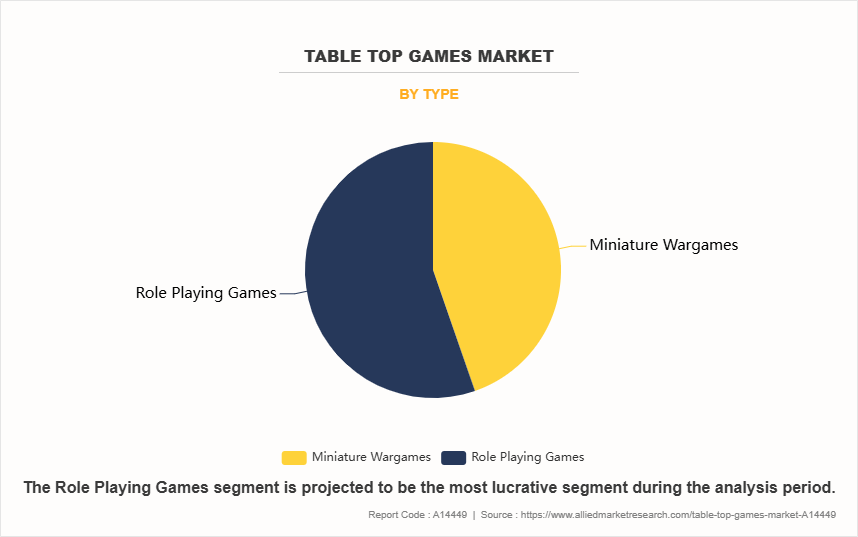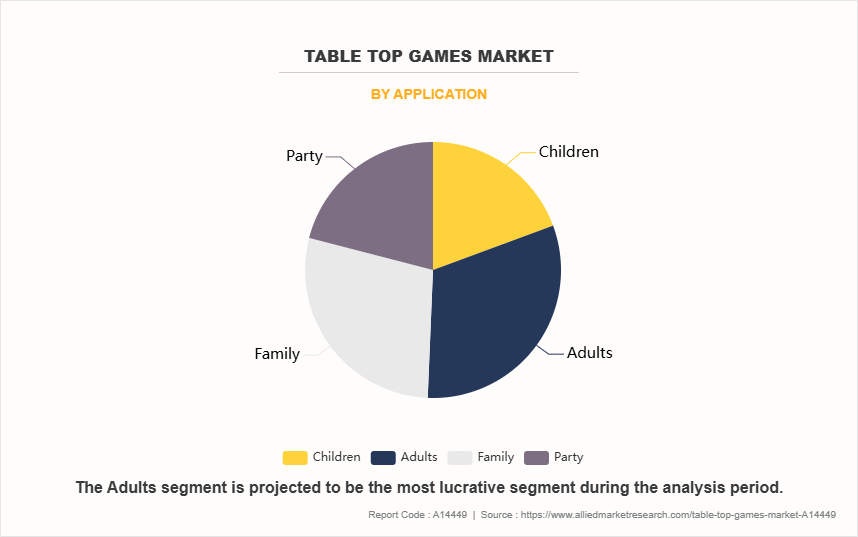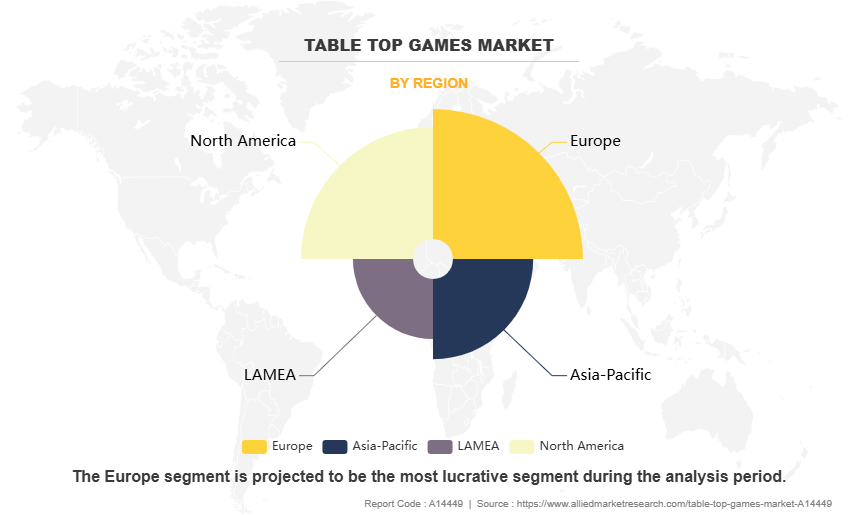Table Top Games Market Research, 2035
The global table top games market was valued at $2.7 billion in 2023, and is projected to reach $5.3 billion by 2035, growing at a CAGR of 5.9% from 2024 to 2035.Table top games refer to board games and include war games, role-playing games, cards, and puzzles. Table top games are interactive and focus on small group play. The scope of the market includes analysis of revenue generated from table top games such as miniature war games and role-playing games (RPGs). Table top games such as role-playing games and miniature war games play a crucial role in the growth and development of children. Strategic and role-playing games are important in brain development as they aid in acquiring logical & reasoning skills and help to gain spatial reasoning and decision-making. Moreover, playing RPGs assists children in learning as well as building social and communication skills. Rise in demand for strategy and adventure-based games among children propels the growth of the table top games industry. The China government relaxed its decades-old one-child policy, allowing all couples to have two kids to address the challenge of an aging population. Therefore, the number of kids is expected to increase in the coming years and positively impact market growth. According to the World Bank, around 25.6% of the global population was under the age of 15 in 2022.
Market Dynamics
Playing a table top game is an activity with considerable complexity, and the player needs some guidance, which is done by a commercial representative of a retailer and game company, by another player, by viewing a video of the play, or by reading the rule books. In recent years, the U.S. have witnessed a rapid expansion in new opportunities for learning how to play hobby games such as table top games, board games, and others, which is expected to propel the growth of the table top games market size.
New opportunities such as programs to demonstrate gameplay at conventions and stores and the creation of videos to teach customers how to play games have been formally organized by game companies to stimulate the sales. Increase in awareness about hobby games such as table top games and board games are expected to fuel the growth of the market in the coming years.
Playing table top games is not a solitary activity but requires a group of players. Those groups can form informally, through players recruiting new players to a group, or through more formal programs to bring players together in commercial venues. The development of organized play programs in hobby game stores, board game nights at bars and restaurants, and game cafes, and restaurants with an ongoing gameplay component is expected to boost the growth of the market.
Consumers must have sufficient time and disposable income to play table top games for entertainment. A consumer that is working two jobs just to make ends meet is not likely to divert money from necessities or time from income-producing activities to table top games. Right now, the U.S. economy has witnessed rise in toward playing table top games as many consumers have enough time and money for some entertainment activities. Table top games publishers and miniature manufacturers must constantly innovate their products to stay ahead of the competition.
One way to accomplish this is to design new and distinctive games and miniatures. This keeps existing customers interested in the product; however, it also helps to attract new ones. Furthermore, creating new and innovative marketing campaigns is another way to innovate and develop the table top games market. Consumer innovativeness, which highlights its independence against the product category, communicated experience, and situational effects, is defined as the extent to which an individual can accept new knowledge and make innovative decisions without being influenced by others. Table top game manufacturers stay ahead of the competition and attract new customers by constantly innovating their products and marketing campaigns.
Table top games publisher and miniature manufacturers must constantly innovate their products to stay ahead of the competition. One way to accomplish this is to design new and distinctive games and miniatures. This not only keeps existing customers interested in the product but also helps to attract new ones. Furthermore, creating new and innovative marketing campaigns is another way to innovate and develop in the table top games market. Consumer innovativeness, which highlights its independence against the product category, communicated experience, and situational effects, is defined as the extent to which an individual can accept new knowledge and make innovative decisions without being influenced by others. Table top game manufacturers can stay ahead of the competition and attract new customers by constantly innovating their products and marketing campaigns.
The market in Asia-Pacific offers lucrative growth opportunities for table top games market players. A large consumer base, along with the rise in disposable income, provides lucrative opportunities for the market players. This region offers potential opportunities to market players to launch premium and interactive table top games with innovative miniatures. Therefore, manufacturers are now focusing on expanding their business in this region to increase their customer base and improve their geographical outreach. Moreover, countries in Latin America, such as Brazil, will unfold attractive opportunities during the forecast period owing to favorable government policies toward large-scale privatization, combating unfair competition. Also, In the developed economies of Europe, packaging is becoming more environmentally friendly as some use earth friendly inks and biodegradable boxes, while others simply use less packaging overall. The players in the table top games market have adopted acquisitions, business expansion, partnerships, collaborations, and product launches as their key development strategies to increase profitability and improve their position in the table top games market.
The use of digital devices instead of board games and hobby games is expected to hamper the growth of the tabletop games industry, particularly in the U.S. and EU. The advent of smartphones, computers, video game systems, and tablets has penetrated every household. Rapid market expansion and proliferation of digital infrastructure in developed and developing regions have given access to the internet to adults and kids. In 2022, the number of internet subscribers in India was 739 million, which was 12% higher than in 2018. Internet penetration across the world is growing steadily. The increase in internet penetration and the rise in highly addictive online games on smartphones and tablets have enormously hampered the table top games market. The easy availability of attention-grabbing gadgets, such as smartphones, video games, and computers will pose a significant challenge for the table top games market in the coming years.
The market in Asia-Pacific offers lucrative growth opportunities for table top games market players. A large consumer base, along with the rise in disposable income, provides lucrative opportunities for the market players. This region offers potential opportunities to market players to launch premium and interactive table top games with innovative miniatures. Therefore, manufacturers are now focusing on expanding their business in this region to increase their customer base and improve their geographical outreach. Moreover, countries in Latin America, such as Brazil, will unfold attractive opportunities during the forecast period owing to favorable government policies toward large-scale privatization, combating unfair competition.
Segmental Overview
The table top games market is segmented into type, application, and region. On the basis of type, the market is divided into miniature war games and role-playing games. On the basis of application, the market is divided into children, adults, family, and party. On the basis of region, the market is analyzed across North America (the U.S., Canada, and Mexico), Europe (Germany, UK, France, Italy, Spain, and rest of Europe), Asia-Pacific (China, Japan, India, Australia, Malaysia, Thailand, and rest of Asia-Pacific), and LAMEA (Latin America, Middle East, and Africa).
By Type

Role-playing games accounted for more than 50% of the table top games market share in terms of revenue in 2023 as they are the most popular type of table top games among consumers. Different types of educational role-playing games are being introduced in schools to develop sportsmanship and decision-making processes among school students. The increase in the adoption of table top games in cafes and bars is also expected to fuel the table top games market growth.
By Application

On the basis of application, the adult segment led the market and accounted for ~30% of the global table top games market in 2023 and is expected to maintain its dominance during the table top games market forecast period. Rise in count of teenagers and adults interested in strategy and war-based games is expected to propel the growth of the table top games market in the coming years.
By Region

On the basis of region, Europe was the largest market in 2023 and had the highest market share. Companies operating in the Europe table top games market are offering innovative products to sustain in the competitive market. They are launching new products to expand their business operations across different countries in this region and increase their customer base.
Competition Analysis
The major players operating in the market focus on key market strategies, such as mergers, product launches, acquisitions, collaborations, and partnerships. They have also been focusing on strengthening their market reach to maintain their reputation in the ever-competitive market. The key players profiled in the table top games market analysis include Asmadi Games (U.S.), Bezier Games (U.S.), Fremont Die Consumer Products (U.S.), Games Workshop (Slovakia), Gibsons Games (UK), Goliath (Netherlands), Hasbro (U.S.), Iello Games (France), Indie Boards And Cards (U.S.), Mattel (U.S.), Ravensburger (Germany), and The Grey Fox Games (U.S.).
Key Benefits to Stakeholders
- Table top games market report report provides a quantitative analysis of the market segments, current trends, estimations, and dynamics of the table top games market analysis from 2023 to 2035 to identify the prevailing table top games market opportunities.
- The market research is offered along with information related to key drivers, restraints, and opportunities.
- Porter's five forces analysis highlights the potency of buyers and suppliers to enable stakeholders make profit-oriented business decisions and strengthen their supplier-buyer network.
- In-depth analysis of the table top games market segmentation assists to determine the prevailing market opportunities.
- Major countries in each region are mapped according to their revenue contribution to the global market.
- Market player positioning facilitates benchmarking and provides a clear understanding of the present position of the market players.
- The report includes the analysis of the regional as well as global table top games market trends, key players, market segments, application areas, and market growth strategies.
Table Top Games Market Report Highlights
| Aspects | Details |
| Market Size By 2035 | USD 5.3 billion |
| Growth Rate | CAGR of 5.9% |
| Forecast period | 2023 - 2035 |
| Report Pages | 250 |
| By Type |
|
| By Application |
|
| By Region |
|
| Key Market Players | Buffalo Games, Ravensburger, Goliath Games, LLC, Mattel, Inc., Korea Boardgames Co., Ltd., Asmodee Group, Australian Design Group, Lifestyle Boardgames Ltd., Hasbro Inc., NSF Boardgames and Puzzles |
Upcoming trends in the global tabletop games market include the rise of hybrid board games integrating digital features like augmented reality (AR) and companion apps, the growing popularity of solo and cooperative gameplay modes, and an increase in eco-friendly, sustainable game production. Additionally, crowdfunding platforms continue to drive innovation, enabling indie developers to introduce unique and niche game concepts.
The leading application of the tabletop games market is the adults segment, driven by the growing popularity of strategy-based, role-playing, and social deduction games. Adults prefer tabletop games for their complex mechanics, immersive storytelling, and social engagement, making them a popular choice for gatherings, game cafés, and team-building activities. The rise of modern board games catering to adult interests and the increasing trend of offline entertainment further boost this segment's dominance.
Europe is the largest regional market for Table Top Games
The table top games market was valued at $2,703.4 million in 2023 and is estimated to reach $5,334.1 million by 2035, exhibiting a CAGR of 5.9% from 2024 to 2035.
Mattle Inc. Golaith, NFC games are the top companies to hold the market share in Table Top Games
Loading Table Of Content...
Loading Research Methodology...


